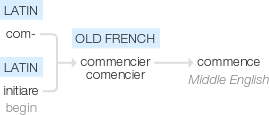Commence
Middle English: from Old French commencier, comencier, based on Latin com- (expressing intensive force) + initiare ‘begin’.
wiktionary
From Middle English commencen, comencen (also as contracted comsen, cumsen), from Anglo-Norman comencer, cumencer, comencier, from Vulgar Latin *cominitiō, *cominitiāre, formed from Latin com- + initiō (see initiate).
etymonline
commence (v.)
c. 1300, "to start, initiate, cause to begin to be" (transitive), from Old French comencier "to begin, to start" (10c., Modern French commencer), from Vulgar Latin *cominitiare, originally "to initiate as priest, consecrate," from Latin com "with, together" (see com-) + initiare "to initiate," from initium "a beginning," literally "a going in," noun use of neuter past participle of inire "to go into, begin," from in- "into, in" (from PIE root *en "in") + ire "to go" (from PIE root *ei- "to go").
From late 14c. in intransitive sense "come into existence, begin to be," also "enter into a new state." Spelling with double -m- began in French and was established in English by 1500. Related: Commenced; commencing.
